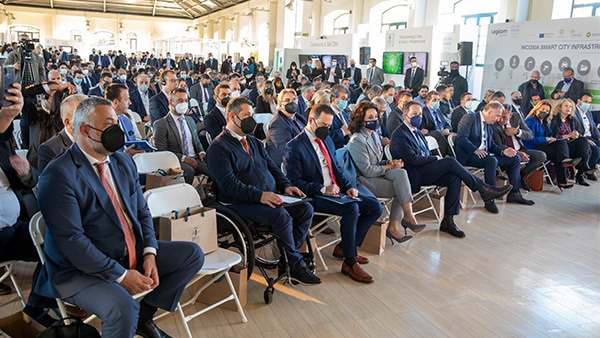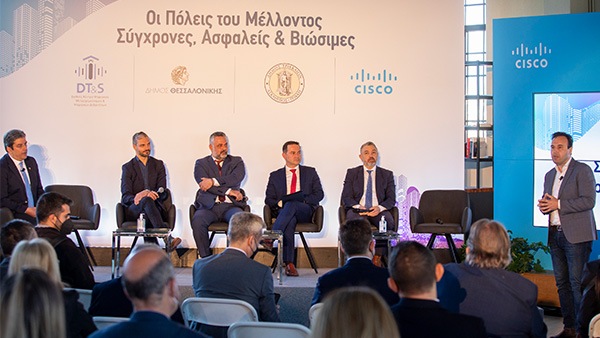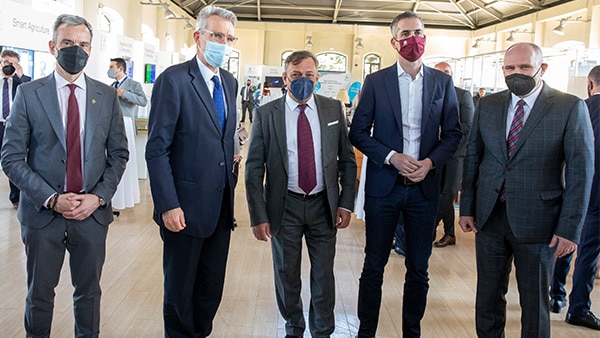Cisco: Strong presence of Local Government and the technology industry from Greece and abroad at the International Conference on the Cities of the Future
Athens, April 14th, 2022 - The International Conference of Cities of Southeast Europe entitled "The cities of the future, modern, safe and sustainable - The time of implementation", which took place in Thessaloniki and Trikala on April 12 and 13, was successfully completed. The two-day event was organized by the International Center for Digital Transformation and Skills-DT&S, Cisco and the Municipalities of Thessaloniki and Trikala.
With the dominant message of the need to accelerate the growth of urban centers, to utilize the available resources in a "smart" and efficient way, to contribute to the improvement of governance and to offer modern and innovative high-quality services to the citizens and visitors of cities, the international conference brought together more than 250 participants from the institutional leadership of Greece, the local government, but also guests from eight other countries. The conference, certifying its title, focused on the "implementation time" highlighting successful examples of smart solutions that combine the necessary structures, with a complete platform of smart solutions, services and functionality. At the same time, among the πpillars at the two-day event was the effective management of infrastructure related to water resources, energy, transport and housing.
The International Conference was opened by the Managing Director of Cisco in Greece, Portugal, Cyprus and Malta, Antonis Tsimpoukis, stating that: "for the first time the conference is held in Greece with the participation of all Southeast European countries. The contribution of Cisco partners in the implementation of the conference was very important, as well as in the creation of the International Center for Digital Transformation and Skills, which started operating in 2020, under the most adverse conditions. The discussion about smart cities started 10 to 15 years ago, initially from foreign cities, while in Greece the first steps were taken at the same time with the Municipality of Trikala as its leader, which until today is a reference point in the implementation of smart cities applications ". During the Conference, Mr. Tsimpoukis stressed: "the fulfilment of the Conference is a point of reference. Through it, a coherent, extroverted and essential framework of dialogue and promotion of the best applicable smart practices that delimit the city of the future is formed".
The Deputy Minister of Interior for Macedonia and Thrace, Stavros Kalafatis, addressed a greeting, stating: "the conference expresses the concern of all of us for Thessaloniki, Macedonia, Greece of tomorrow, serves development and social goals and shows ways we can and should take. At the same time, it highlights the synergies of the public with the private sector, the good practices, the smart solutions that find application through digital technology in the daily life of the citizens ". The Deputy Minister underlined the emphasis placed by the government on the promotion of new technologies, stressing that: "the government has included for funding in the Development Program for Local Government fifteen projects in the " Smart Cities " category, with a total budget of about 23.7 million. euro. Especially for Thessaloniki, projects are underway to improve the digital infrastructure and optimize digital services to the citizens, but also smart lighting and security through technologies, with a budget of 9.9 million euros through the Recovery Fund."
During the greeting addressed by the Mayor of Thessaloniki, Konstantinos Zervas stated: "in the conference for the cities of the future, more than two hundred participations are recorded from Greece but also from foreign countries. These are basically participations of Municipalities but also of the largest companies in the field of informatics. This is extroversion in practice to us. For our city, now is the time for implementation, as only last year the Municipality designed and submitted proposals for project funding of 100 million euros, of which 18 million euros relate to the field of smart policies. Our vision for Thessaloniki is to function as a model of a smart city ". Regarding the International Center for Digital Transformation and Skills, Mr. Zervas pointed out that it has become a headquarters and a hub for innovation, networking and digital skills.
On her part, the head of the Office of the Prime Minister in Thessaloniki, Maria Antoniou, during her greeting, among other things said: "every city can become a smart city, but first we must consider the problems that brought us here and then deal with them effectively. And this will be done only with the use of new technologies and digital solutions ". Regarding the problems Greece is facing, Ms. Antoniou underlined that: "Our country has been taking its first steps in the digital transformation since 2004, recording impressive results. The digital steps of the Municipality of Trikala are followed by other big cities such as Heraklion, Larissa, Ioannina and Veria ".
The financial tools at the disposal of the Greek municipalities were described during the two-day conference by the Alternate Minister of Interior, Stelios Petsas. "Municipalities can raise funds for digital transformation projects from the program of the Ministry of Digital Government, but also from actions of the Ministry of Interior, which "run" together with the EIB a super-program of 2.1 billion euros that includes actions for the sustainable Greek city of the future". At the same time, Mr. Petsas referred to the "Antonis Tritsis" program, which only in the invitation 6 "Quality of Life and orderly operation of cities, rural areas and settlements", 30% of the integrations concern sustainable urban mobility projects, adding that: "100 million euros have been included in the 8th call for Municipalities along with Civil Protection and concerns projects that utilize modern technological tools to prevent the effects of climate change in cities."
From the podium of the conference, the Deputy Minister of Development and Investments, Giannis Tsakiris, announced that in the coming years investments are planned, through financial tools, amounting to 320 million euros for smart cities. "Smart cities are a framework project for the development of digital applications, with the aim of upgrading public life, improving the daily lives of citizens and protecting the environment." In the context of the Recovery Fund, the Deputy Minister said that the submission of proposals for the action of smart cities was completed in March. "This invitation envisages the financing of 17 Municipalities of the country, ie 16 with a population of over 100 thousand inhabitants and the Municipality of Trikala as a model of a smart Municipality, with a total budget of 90 million euros. So, the resources are there. "Now, we have reached the point that if we do not implement, we will lose significant time from the path to an integrated city, which belongs, lives and works for its inhabitants," said Mr. Tsakiris.
The need not to miss the opportunity created for the perspective of the Greek cities by the Community resources, from the Recovery Fund, the "Antonis Tritsis" and the new NSRF, underlined during his speech, the president of the Central Union of Municipalities of Greece and Mayor of Trikala, Dimitris Papastergiou. "Today we have the biggest opportunity for the Local Government in terms of investment tools. It is about half a billion for projects that will make our cities safer, cities that you will be happy to live in," said the Mayor. At the same time, Mr. Papastergiou referred to the huge opportunities that exist in the energy sector, emphasizing that: "We must see how to set up new models that will make our Municipalities more productive, more economical and more environmentally friendly."
The successful example of smart solutions of the Municipality of Nicosia was presented during the two-day conference by the Mayor, Konstantinos Giorgatzis. "The smart city system provides for the installation of data networks and sensor networks. The data will be collected in centers belonging to the Municipality, in order to be managed by special platforms for the benefit of the citizens. The structure of the system includes a municipal fiber optic network, Wi-Fi wireless network and LoRaWAN network in which many sensors and internet security systems will be interconnected ", said the Mayor. Mr. Giorgatzis pointed out, among other things, that the city of Nicosia is now becoming a smart city and is implementing digital governance solutions, in the framework of the strategic plan and business plan that it created in 2018.
On his part, the Director of the International Center for Digital Transformation and Skills, Nikos Lambrogeorgos said, among other things: "In a period characterized by a constant mobility and dynamic redefinition of the daily life of all of us in the social tissues in which we live, attempt and create, it is a requirement to move to the 'time of implementation' and the implementation of smart solutions. At the International Conference of Cities in South East Europe, we seek to highlight this dimension that brings to the fore the implementations that have taken place, the transfer of good practices and the results of these interventions, the changes that have brought about the daily operation of structures and citizens' lives. through the extroverted interconnection of the cities of Southeastern Europe ".
The completion of the digitization of all services of the Municipality of Athens by the end of the year, announced from the podium of the Conference the Mayor of Athens, Costas Bakogiannis. "Currently, 70% of the services of the Municipality have been digitized. The citizens no longer need to struggle. "They can do their job easily and quickly from home, office or mobile phone," said the Mayor. Mr. Bakoyannis pointed out that digitization is not an end in itself, but acquires meaning and substance when it makes people's lives better, while he also referred to the e-government of the Municipality, which includes important initiatives such as the complete upgrade of the Municipal Protocol, the creation of a platform for monitoring the progress of projects in the city and infrastructure projects in schools. The Mayor made a special reference to the project of electric lighting, which as he said is the biggest step of Athens in the era of smart cities.
The smart system of controlled access to the pedestrian parts of the city of Larissa, was presented by the Deputy Mayor of Sustainable Mobility and Smart City Systems of the Municipality of Larissa, Dinos Diamantos. "With the intelligent system, we have achieved a human-centered approach so that the needs of the citizens only work within the pedestrian area of the city with a lower environmental burden but also a total change of mentality of the users", stressed the Deputy Mayor.
The Conference was honored by the presence of the US Ambassador to Greece, Geoffrey Pyatt. During his speech, he stressed that it is encouraging that American companies, such as Cisco, reinvest in Thessaloniki and see the prospects of the city's youth, while also referring to the city of Trikala, which he said was a surprise and a source of excitement for him. "The city of Trikala is a bright example of how such initiatives do not have to be limited to big cities like Athens and Thessaloniki, but can be developed even in the smallest corners of the country in a way that enhances interconnection among people to make local governments as smart and efficient as possible."
On his part, the Mayor of Piraeus, Giannis Moralis comprehensively developed the policies of the Municipality in relation to its transformation in recent years and in the future into a more sustainable city. He made special mention of how the cities could develop joint actions in this field, while as he said the goal of the Municipality is to make Piraeus an extroverted and smart city.
In perfect symmetry with the main aspects of the Conference, the international participants, from Mayors to representatives of the Municipal Authorities, presented the examples of their Municipalities and referred to the transformation of their cities, through the implementation of smart solutions. The Mayor of Skopje, Danela Arsovka, stressed that "promoting digital transformation in cities primarily means that it will be accessible to all residents". On her part, the Deputy Mayor for International Affairs of the Municipality of Tirana, Anuela Ristani, clarified that the need for transformation is more urgent than ever, as she said: "I do not think there is any city in the world that likes its residents to wait five hours in a queue to provide them with a service." Speaking about the contribution of the smart city, especially to the improvement of the environment, the Deputy Mayor of Sarajevo, Anja Margetic, stressed: "Sarajevo was the first city to introduce the term smart city in the 1970s. In fact, the smart city is a clean city. "
During her speech, the Deputy Mayor of the Municipality of Pristina, Donjeta Sahatciu, spoke about the projects that will make their city safer and more humane, while Onur Eryüce from the Municipality of Smyrna pointed out that: “the most critical element in designing a smart city is how to combine different resources in order to effectively manage its resources and services ". Borko Milosavljevicm from the Municipality of Belgrade referred to the strategic planning for the development of smart cities, emphasizing that: "first we must recognize and define our goal which is to create a smart city and then proceed to a targeted strategic planning with interventions and actions ". At the same time, Erol Özgüner from the Municipality of Istanbul emphasized the green urban planning that falls under the actions of smart cities and stated that: “infrastructure is very important, it all starts with it. "In Istanbul we have a 4,000 thousand fiber optic network."
The Conference was organized with the support of Logicom Solutions, COSMOTE, Space Hellas, Cosmos Business Systems, Lever, GlobiSmart, Unisystems, Amazon Web Services, Novoville, OTS, Wind, DEXTERA Consulting, Urbanica, Yodiwo & WINGS ICT Solutions. The benefits of digital solutions were mentioned by the companies that develop and offer innovative solutions and digital transformation services and which supported the organization of the Conference, emphasizing that their goal is to facilitate and increase the interaction between citizens, structures and city authorities. Among them, the General Manager of Logicom Solutions's office in Greece, Kyriakos Apostolidis stated that: "It is important that municipalities address companies that have the necessary experience and that approach these issues in a holistic way in order to create a variety of innovative services for citizens." On his part, the Chief Innovation Officer of Space Hellas, Sotiris Karagiannis referred to the capabilities of the Group's systems and applications with the main aspects of improving the life of the citizens and saving resources and energy, while the new platform for smart cities was announced under the name "Citysense". Referring to the benefits of digital solutions, the Public Sector & ICT Executive Director of the joint management team of Nova & Wind, Alexandros Bregiannis noted that: "they contribute to the creation of smart cities to meet modern urban challenges and invest systematically in the development of information and communication technologies (ICT)", while the Senior Account Manager ICT / Smart City of OTE Group of Companies (HTO), Maria Paschalidou stressed that: "smart city projects are projects that are complex, have equipment and software from various manufacturers and all this at the end of the day must work as a whole."









